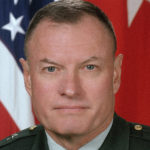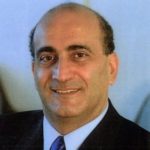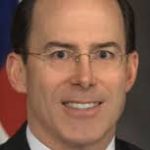The major complaint in U.S. policy shops is that Trump has picked backbenchers who do not point to any coherent policy orientation.

The Donald roars. Graphic by DonkeyHotey / Flickr.
In 2016, what was old has become new, what was odd has become commonplace, and what was settled scoots across the prairie like a dust cloud before a storm. Not only the United States but also much of the world is watching to see if the storm hits in November.
American Indians have involuntarily become part of the argument about foreign policy in this exceedingly strange election cycle in spite of the Supreme Court’s determination in 1831 that tribal governments represent “domestic, dependent nations.” Indian affairs moved officially from the Department of War to the Department of the Interior in 1849.
A Trump foreign policy advisor has defined Indians once more as an external threat.
The shift of Indian policy from foreign to domestic policy happened in law before it happened in the bureaucracy and the bureaucracy changed before U.S. election campaigns quit raising the threat posed by Indians. This year, a foreign policy advisor to the leading Republican candidate for president has defined Indians once more as an external threat and linked a tribal business corporation to the major foreign policy threats of our times, nuclear weapons and terrorism.
Suppose the world woke up November 9, 2016, and the foreign policy of the United States was that NATO has outlived its usefulness, that Japan and South Korea and several other nations becoming nuclear powers is unfortunate but inevitable, that the answer to North Korea’s provocations is to demand that China “disappear” Kim Jong Un, and that ISIS can be defeated in no time by bombing some oil wells? Suppose that the new man in charge appeared disposed to renegotiate every multilateral trade agreement from the last 20 years and defense commitments in place since WWII?
Suppose an American president referred to the administrative capital of the European Union as “a hellhole,” wished to withdraw from treaties banning torture, refused to renounce the first use of nuclear weapons, and promised that all of his foreign policy would be tethered to a slogan, “America first!”
Since history is not Donald Trump’s strong suit, he may be unaware that “America first!” carries a lot of foreign policy baggage from its first run. With Charles Lindbergh as spokesman, the purpose was opposing the Lend-Lease policy of supporting Britain against Nazi Germany by any means short of war.
Trump’s policy rhetoric bears a lot of resemblance to the America Firsters.
Which is worse? That Trump fully understands his historical forebears or that he does not? Trump’s policy rhetoric bears a lot of resemblance to the America Firsters who would have let Britain go down. Suppose Trump explicitly acknowledged his debt to that movement and he unpacked all of his policy desiderata for world reaction?
In considering how the world would react, it might be useful to notice how the world has already reacted to Donald Trump’s foreign policy platform.
Bloomberg reported from the World Economic Forum, “The Specter of Donald Trump is Haunting Davos.”
Reuters, citing unnamed “U.S. government officials,” claimed that diplomats from four continents have expressed concern to both the State Department and President Obama’s national security team about Trump’s statements.
The British House of Commons debated declaring the Republican front-runner persona non grata.
The 2012 Republican nominee for president, Mitt Romney, declared for anybody but Trump, and the 2008 nominee, John McCain, warned of Trump’s “uninformed and indeed dangerous statements on national security issues.”
Since Trump’s education and experience are focused on business rather than questions of war and peace, the identity of his foreign policy team became a matter of great interest and speculation among reporters. One such was Mika Brzezinski, co-host of Morning Joe on MSNBC with former Congressman Joe Scarborough (R-FL). Her father is Zbigniew Brzezinski, who served as National Security Advisor to President Jimmy Carter.
‘Morning Joe had its head so far up Donald Trump’s ass it bumped into Chris Christie.’
The Morning Joe team risked the ridicule of peers to take Trump seriously before anyone else did. Larry Wilmore got into it at the White House Correspondent’s Dinner when he remarked, “Morning Joe had its head so far up Donald Trump’s ass it bumped into Chris Christie.”
Trump, whatever his reasons, has called in to the show regularly during the campaign. Brzezinski is something of a foreign policy nerd from having grown up with it, so she asked Trump in early March the question on everybody’s mind: Who are his foreign policy advisors?
Trump talked around the question and obfuscated but she persisted in asking for names. He claimed he was not at liberty to say right then but would give names the next time he was on.
Came Trump’s next interview on Morning Joe and it appeared he did not remember that promise. Brzezinski did, and she pressed him again.
“I’m speaking with myself, number one, because I have a very good brain and I said a lot of things,” quoth The Donald, adding, “my primary consultant is myself and I have a good instinct for this stuff.” This revelation came on March 16. It was all over political media before the day was over and the subject of much ridicule.
So much ridicule, in fact, that even Trump felt the need to respond. Within the week, he released five names as the core of his foreign policy team. It helps to understand the widespread puzzlement if you know that foreign policy experts in this country are centered in a few major universities and fewer think tanks. Those who publish in the field know each other’s ideas, and the identity of a candidate’s core foreign policy team normally tells where the candidate stands on the broad questions facing the country.
The announcement of Trump’s team had even foreign policy experts scurrying to Google.
The announcement of Trump’s team had even foreign policy experts scurrying to Google. The major complaint in U.S. policy shops is that Trump has picked backbenchers who do not point to any coherent policy orientation. It is possible to pick out bits of Trump’s positions among the five and one of his choices is of particular concern to Indians. In alphabetical order, Trump’s core foreign policy team is:
 Retired Army Lt. Gen. Joseph “Keith” Kellogg served as chief operating officer of the Coalition Provisional Authority in Baghdad, Iraq, from November 2003 through March 2004. The Authority was the de facto government installed by the U.S. after its March 2003 invasion of Iraq. It oversaw the “de-Baathification” of the Iraqi Army that ended up providing the officer corps for ISIS. In hindsight, Kellogg called de-Baathification “extreme,” but his involvement in the debacle is no decoration on a foreign policy résumé.
Retired Army Lt. Gen. Joseph “Keith” Kellogg served as chief operating officer of the Coalition Provisional Authority in Baghdad, Iraq, from November 2003 through March 2004. The Authority was the de facto government installed by the U.S. after its March 2003 invasion of Iraq. It oversaw the “de-Baathification” of the Iraqi Army that ended up providing the officer corps for ISIS. In hindsight, Kellogg called de-Baathification “extreme,” but his involvement in the debacle is no decoration on a foreign policy résumé.
 Carter Page is a Naval Academy graduate and former investment banker who has blogged that the U.S. is provoking Russia, and he buys (or at least sells) the Russian line that the U.S. State Department was behind the 2014 overthrow of the Ukraine government. His primary qualification is his highly lucrative relationship with the Russian natural gas giant Gazprom. His advice could explain Trump’s admiration for Vladimir Putin.
Carter Page is a Naval Academy graduate and former investment banker who has blogged that the U.S. is provoking Russia, and he buys (or at least sells) the Russian line that the U.S. State Department was behind the 2014 overthrow of the Ukraine government. His primary qualification is his highly lucrative relationship with the Russian natural gas giant Gazprom. His advice could explain Trump’s admiration for Vladimir Putin.
 Trump apparently acquired George Papadopoulos from the Ben Carson campaign. Papadopoulos graduated from DePaul University in 2009 and lists among his qualifications participation in the 2012 Model UN in Geneva, an exercise for students. He claims to have worked as a researcher at the Hudson Institute, a conservative think tank that runs a foreign policy shop, but a search for his name on the Hudson website was in vain.
Trump apparently acquired George Papadopoulos from the Ben Carson campaign. Papadopoulos graduated from DePaul University in 2009 and lists among his qualifications participation in the 2012 Model UN in Geneva, an exercise for students. He claims to have worked as a researcher at the Hudson Institute, a conservative think tank that runs a foreign policy shop, but a search for his name on the Hudson website was in vain.
The only foreign policy issue with his brand on it is an argument that Israel should ship its newly discovered natural gas by way of facilities on Cyprus not yet built to Europe (where it would compete with the newly authorized liquefied petroleum gas shipments from the U.S.) rather than to an existing pipeline in Turkey.
Walid Phares was a member of a Lebanese Christian militia suspected of war crimes.
 Walid Phares, a former Romney advisor from the conservative Foundation for the Defense of Democracies, was a member of a Lebanese Christian militia suspected of war crimes. He is primarily noted for sounding the alarm that Sharia law is a threat to the U.S. legal system and Politico remembered that in 2012 he alleged that the Obama administration is infiltrated by the Muslim Brotherhood. While Phares has no foreign policy expertise, his Islamophobia is consistent with Trump’s call to exclude all Muslims from the U.S.
Walid Phares, a former Romney advisor from the conservative Foundation for the Defense of Democracies, was a member of a Lebanese Christian militia suspected of war crimes. He is primarily noted for sounding the alarm that Sharia law is a threat to the U.S. legal system and Politico remembered that in 2012 he alleged that the Obama administration is infiltrated by the Muslim Brotherhood. While Phares has no foreign policy expertise, his Islamophobia is consistent with Trump’s call to exclude all Muslims from the U.S.
 The name that gives Indians reason for trepidation is Joseph Schmitz, former Pentagon Inspector General and co-author of Shariah: The Threat to America. Schmitz’s tenure as Inspector General ended under ethical clouds. Republican Sen. Chuck Grassley accused Schmitz of blocking investigations of Bush administration officials and war contracts. McCain, the senior Republican senator from Arizona, called the subject of one derailed investigation “a textbook case of bad procurement policy and favoritism to a single defense contractor.”
The name that gives Indians reason for trepidation is Joseph Schmitz, former Pentagon Inspector General and co-author of Shariah: The Threat to America. Schmitz’s tenure as Inspector General ended under ethical clouds. Republican Sen. Chuck Grassley accused Schmitz of blocking investigations of Bush administration officials and war contracts. McCain, the senior Republican senator from Arizona, called the subject of one derailed investigation “a textbook case of bad procurement policy and favoritism to a single defense contractor.”
Schmitz followed up these allegations of professional conflicts of interest with a personal one that is beyond question. He went to work for Prince Group, the parent company of Blackwater USA, the recipient of over $1 billion in government contracts. Danielle Brian, executive director of the Project on Government Oversight, commented in The Washington Post: “To see a person who has been holding that position cash in on his public service and go work for one of their contractors is tremendously disappointing.”
Schmitz first drew attention in Indian country for his role as counsel in a lawsuit to prevent the Confederated Salish and Kootenai Tribes from taking over a dam on tribal land, formerly known as Kerr Dam and now called Salish-Kootenai Dam. The named plaintiffs were Republican politicians, former state Sen. Verdell Jackson and current state Sen. Bob Keenan. The “legal” theory asserted to keep the tribes from acquiring the dam is particularly pertinent to Schmitz’s foreign policy bona fides.
The tribes’ owning the dam was ‘a terrorist plot to help Turkey acquire nuclear materials.’
The claim to stop the tribes from owning the dam on their property was that the acquisition of it was part of a terrorist plot to help Turkey acquire nuclear materials.
While it is true that Turkey is among the handful of foreign nations to have direct relationships with Indian nations, those relationships have been about a Turkish invitation to Indian students in study abroad programs to choose Turkey as a destination, and Turkish grants to tribes for economic development. In 2012, the Turkish Cooperation and Coordination Agency (TIKA) offered a development grant to tribal governments, a competition won by the Confederated Tribes of Warm Springs Reservation for a water project.
While it is true that most Turks are Muslims and there are some people in this country who think all Muslims are terrorists, those ideas have little currency in the fact-based community that dominates most foreign policy discussion.
It is not true that the Salish and Kootenai people have had any dealing with Turkey about hydropower, let alone nuclear materials.
It is not true that Turks are proselytizing for Islam on the Flathead Reservation. George Ochenski, writing in a Missoulian op-ed, opined about “Turkish Islam terrorists taking over the Salish-Kootenai” that “after a century of having non-Indians try to take over everything the tribe was supposed to get in the Hellgate Treaty of 1855, Turks are the least of tribal or non-tribal citizens’ worries.”
It is not true that Turks are proselytizing for Islam on the Flathead Reservation.
The sensational national security allegations in the attempt to stop the dam transaction are just blurted out — what lawyers call conclusory pleading. Normally, the lawyers would lay out each link in a conspiracy in a series of numbered paragraphs leading to the conclusion that if the Indians take over the dam then the Turks will use that transaction in some terrorist enterprise. If this scenario has you scratching your head, take solace: it had the same impact on the judge who heard the case.
The “logic” of the national security complaint starts with the general statement that Turkey is involving itself with Indian tribes because “the reservation is largely off-limits to federal and state regulatory authorities.” This is true as to state regulation but nonsense as to federal power. The plaintiffs warn “this (imaginary) setting would provide Turkey and such organizations with the opportunity to more freely promote their brand of Islam on reservations and/or to pursue other potentially more dangerous activities.”
This leads to the claim that Turkey seeks “access to the uranium deposits and bountiful water sources surrounding the Flathead Reservation for production of yellowcake capable of later conversion to a gaseous state for eventual use in incendiary devices.”
U.S. District Judge Rudolph Contreras denied the request to stop the tribes, finding the lawsuit “failed to raise any fact or point to any evidence in the application for transfer that would materially call into question (the tribes’) suitability to serve as licensee.” Judge Contreras only noted in passing “somewhat perplexing arguments regarding the Turkish government’s involvement with Native Americans.”
There would be nothing sinister in tribal relations with Turkey if the Flathead Reservation had any.
Turkey is a NATO ally of the U.S. The NATO treaty is known among even people who have not read it for Article Five, which holds that an attack on one NATO member is an attack on all. In other words, Turkey is under the protection of the U.S. nuclear umbrella. There would be nothing sinister in tribal relations with Turkey if the Flathead Reservation had any.
Energy Keepers is the tribal business corporation formed for the purpose of marketing electricity, with a strong tribal preference for renewable electricity. Hydroelectric power fills the renewable bill, and gaining control of the dam formerly known as Kerr is the tribal opening to the electricity market. It is unclear how Joseph Schmitz thought Energy Keepers would get access to nuclear materials from operating a hydroelectric power plant beyond the bare allegation that there are uranium deposits somewhere on the Flathead Reservation.
If the Salish and Kootenai people somehow gained access to nuclear materials, it would still be a mystery why Turkey would come to the U.S. for nuclear materials when they live near the remains of the Soviet Union — where the accounting is a bit more lax than it would be in Montana. The mechanics of this alleged terrorist plot are as mysterious as why George Papadopoulos is on a jihad to prevent Israeli natural gas from finding its way into Turkish pipelines.
The fantasy of the terrorist conspiracy could be dismissed as low comedy.
The fantasy of the terrorist conspiracy between Turkey and the Flathead Reservation could be dismissed as low comedy, but Schmitz is a fellow traveler with the Citizens Equal Rights Alliance (CERA), one of several organizations vying to be the tip of the legal spear that stands the best chance of plunging into the heart of tribal sovereignty.
The argument is the one that has been deployed repeatedly and with great success against Native Hawaiians: Any program or policy that contains an advantage or benefit for indigenous people is unconstitutional racial discrimination against white people. There were probably three votes for that proposition on the Supreme Court before the death of Justice Antonin Scalia. The number is now probably down to two.
Schmitz’s co-counsel in the lawsuit to stop the Salish and Kootenai people from acquiring Kerr Dam was Lawrence Kogan, who was a featured speaker at a CERA regional conference held in Kalispell, Montana, last year with the theme “This Land Is Our Land … Or Is It? Corrupt and Unconstitutional Federal Indian Policy and Rogue Federal Agencies.”
Schmitz warned of ‘multiculturalism, political correctness, misguided notions of tolerance.’
Schmitz has warned of the dangers in “multiculturalism, political correctness, [and] misguided notions of tolerance.” This political alarm echoes the xenophobia of the Trump campaign that has struck a sympathetic chord in between a third and half of Republican Party voters. Trump gives voice to the middle-aged white males who are losing their privilege and CERA’s analysis offers Trump a way to fling the accusation of racial discrimination back in the face of non-white minorities.
Before Trump kicked off his presidential campaign with an attack on Mexicans, and long before he advocated keeping Muslims out, he was battling Indian tribal governments over what he believes are racial privileges in the Indian Gaming Regulatory Act. This is precisely CERA’s position.
So it was that Trump’s revelation of his inner circle of foreign policy advisors harked back to the days when Indian policy was foreign policy. Without tribal sovereignty, the argument will go, the tribes of the Flathead Reservation would be unable to conspire with Turkey to acquire nuclear materials in support of terrorism. Nor would they be allowed to compete with President Trump’s casinos.
Looking at these five “foreign policy advisors,” particularly Joseph Schmitz, Indians could be excused for wondering if they were better off when Trump’s foreign policy team was Donald Trump. Then it was obvious that Trump was advancing his own economic interests.
Schmitz connects Trump to the CERA analysis of why tribal sovereignty is an unfair and unconstitutional advantage. If Trump is a warrior in defense of white people, it’s no great stretch to accuse the Indian tribes on the other side of that war of supporting terrorism. Provided, of course, that Trump does not become too tethered to fact-based reality for a candidate in the Republican Primary.
Read more articles by Steve Russell on The Rag Blog.
[Steve Russell lives in Sun City, Texas, near Austin. He is a Texas trial court judge by assignment and associate professor emeritus of criminal justice at Indiana University-Bloomington. Russell, who belongs to the Cherokee Nation of Oklahoma, is also a columnist for Indian Country Today Media Network. Steve was an activist in Austin in the sixties and seventies, and wrote for Austin’s underground paper, The Rag. He can be reached at swrussel@indiana.edu. ]

















